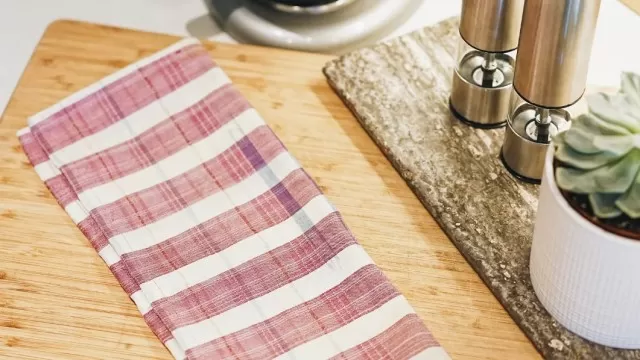Determining the ideal washing frequency for your kitchen towels is crucial because these linens have a knack for accumulating dirt and bacteria rather swiftly.

Kitchen towels and dish rags are undoubtedly valuable tools, not only for their eco-friendly nature but also for their versatility in everyday tasks.
These reusable alternatives can effectively replace single-use paper products, serving various purposes such as wiping down countertops, handling hot dishes from the microwave, and drying hands. However, it’s essential to be mindful of how you use these items, as their prolonged use without washing can inadvertently lead to the spread of bacteria throughout your hands and home surfaces.
Take a moment to reflect: When was the last time you actually laundered your kitchen towels? Have you ever found yourself using the same towel for a week or even longer? If you can’t recall or if your answer is in the affirmative, it’s crucial to delve into the facts that highlight the importance of regularly washing your kitchen towels.
These insights will serve as a compelling reminder to maintain proper hygiene practices and ensure that your kitchen towels remain effective and safe tools in your home.
The Consequences of Neglecting Your Kitchen Towels

If you’re in the habit of using your kitchen towels to wipe down counters night after night without giving them a regular wash, you might unknowingly be creating a breeding ground for harmful bacteria on these very towels.
A study conducted in 2018 at the University of Mauritius sheds light on this issue.
The research revealed that after just one month of use, 49 percent of the kitchen towels examined displayed bacterial growth, and these bacteria included the same pathogens responsible for causing foodborne illnesses in both adults and children.
Furthermore, the study unveiled a correlation between the amount of bacteria found on the kitchen towels and various factors.
The size of the family using the towels, the dietary habits (meat-based or vegetarian) of the family, and the duration the towels were used without washing all influenced the bacterial load. Interestingly, families with non-vegetarian diets were more likely to have higher bacterial counts on their towels.
This finding prompted researchers to speculate that improper handling of uncooked meat might be a common issue, contributing to the proliferation of bacteria on kitchen towels.
So, not regularly washing your kitchen towels can potentially lead to a hidden health hazard, emphasizing the importance of maintaining good hygiene practices, especially in the kitchen.
How Frequently Should You Launder Your Kitchen Towels and Dish Rags?

Determining the ideal washing frequency for your kitchen towels is crucial because these linens have a knack for accumulating dirt and bacteria rather swiftly.
The recommended washing interval depends on their usage, making it a matter of practicality and hygiene. Here’s some guidance to help you decide when it’s time to clean those kitchen towels:.
Usage Matters: If your kitchen towels are primarily employed for drying freshly washed hands, you can extend their usage a bit longer.
However, if they come into contact with raw meat or fish during meal preparation, it’s imperative to toss them into the laundry immediately.
Hot Water Wash: When you do decide to launder your kitchen towels, make sure to use hot water for washing.
This helps ensure that bacteria and contaminants are effectively eradicated.
Monitoring Wear and Tear: Keep an eye on the condition of your kitchen towels.
If they begin to fray or tear, it’s time to consider replacing them. You can either dispose of them responsibly or drop them off at a textile recycling center.
Some experts go to great lengths to emphasize the importance of frequent washing, even advocating for daily or after each single use.
A study conducted at Kansas State University in 2015 discovered that kitchen towels were the most heavily contaminated items in the kitchen. Participants in the study were found to handle towels more frequently than expected, sometimes touching them before adequately washing their hands or reusing them after washing their hands improperly.
This practice often led to self-contamination.
To manage this frequent use, consider stocking a few dish towels.
Rotate them and introduce fresh ones as needed, collecting the soiled ones in a designated bin until laundry day. Ultimately, the decision on how often to wash your kitchen towels should align with what you believe is best for your household.
Nevertheless, these findings serve as a valuable reminder to consider washing your kitchen towels more frequently than you might currently be doing. Prioritizing hygiene in the kitchen can contribute to a healthier living environment for you and your family.
*The information is for reference only.